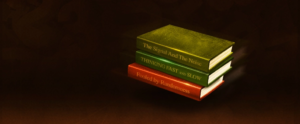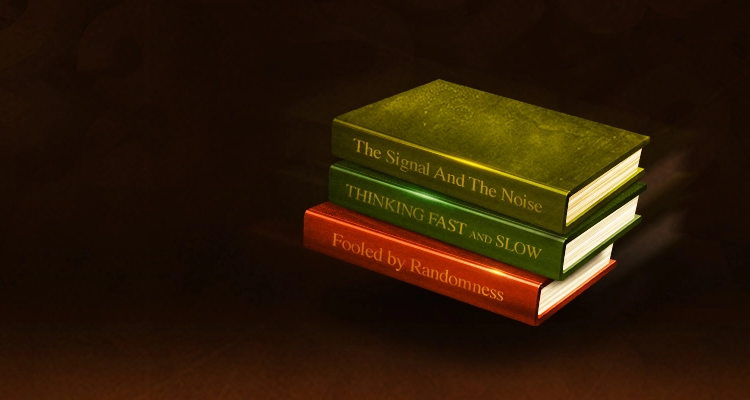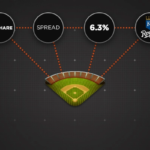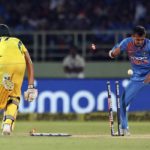3 books to read for bettors
Want to know the best reads for betting? Our Head of Sportsbook asked to recommend the most desirable betting relevant books he had read. Find out what his choice was and why it is so surprising.

When we put our Head of Sportsbook on the spot, he did not hesitate with his response《Fooled by Nassim Nicholas Taleb’s Randomness》a book that is not specifically about betting. If this seems to be an odd decision, then you may need to rethink what betting information constitutes.
Taking this idea a little further, we’ve added two more books that have a tremendous amount to offer aspiring bettors, but that would otherwise be listed on Amazon. They will make it easier for bettors to scale the learning curve in betting.
1.《Fooled by Randomness: The Hidden Role of Chance in Life and in the Markets》 by Nassim Nicholas Taleb
Fooled by Randomness is a standalone book in the groundbreaking Incerto series by Nassim Nicholas Taleb, an investigation into complexity, chance, ambiguity, probability, human error, risk, and decision-making in a world that we don’t understand.
Now the Fooled by Randomness is the feeling of word-of-mouth that will change the way you think about finance and the environment. Nassim Nicholas Taleb – veteran investor, renowned risk specialist, polymathic academic, erudite raconteur, and The Black Swan’s New York Times bestseller – wrote a modern classic that flips on his head what we believe about luck and skill.
This book is about luck – or, more accurately, how in life and business we view and deal with luck. Set against the backdrop of the most prominent platform where chance is mistaken for skill – the trading world – Fooled by Randomness offers a captivating insight into one of the least understood variables in our entire lives. Writing in an engaging narrative style, the author deals with significant philosophical issues related to underestimating luck’s impact on our lives.
Taleb, along with a decent amount of condescension, uses probability theory, basic statistics, and personality prejudices to ram his message home. He may not have explored all of the topics that he studies. Still, his compilation of the subjects could not have been more timely considering the secure link between these issues and the financial crisis of 2008, the consequences of which still felt worldwide.
From experience, Taleb talks. Thanks to his prescient predictions and considerable personal financial benefits from getting skin in the game – to use one of his own words – his reputation gained tremendously.
That said, Fooled by Randomness does not contain winning systems or tips. In reality, as pure snake-oil salesmen, it exposes many supposed experts (interchangeable for tipsters) in the risk analysis.
Taleb always stresses the dangers of listening to self-appointed experts and celebrates the virtues of conducting your unbiased study. Amen. Amen.
2.《Thinking, Fast and Slow》 by Daniel Kahneman
The second of our suggested books have far less precise reference to betting than the first, but it is incredibly applicable to bettors. One of the most significant problems facing a bettor, aside from trying to beat the bookmaker, is trying to regulate and counterbalance its own inherent tendency toward irrationality.
Kahneman takes us on a pioneering tour of the mind in the highly awaited Thinking, Fast and Slow, and explains the two systems which drive the way we think. System 1 is fast, intuitive, and emotional; System 2 is slower, more deliberate, and more logical.Kahneman shows the exceptional abilities of quick thinking — and also the flaws and biases — and reveals the overwhelming effect of intuitive experiences on our thoughts and behavior. The influence of loss aversion and overconfidence on business strategies, the complexities of predicting what would make us successful in the future, the challenges of adequately framing risks at work and at home, the profound effects of cognitive biases on anything from playing the stock market to preparing the next holiday – everything can only be appreciated by understanding how the two mechanisms act together to shape our judgments and decisions.
The theory showed that people make choices based on the possible value of losses and gains rather than the actual result and that people use other heuristics to determine certain losses and gains – thumb laws. Mainly, betters go through this cycle whenever they make a bet, so knowledge of heuristics and how they work is vital, and Thought, Quick and Slow gives a great introduction.
3.《The Signal and the Noise》 by Nate Silver
We conclude our trilogy of popular betting books with another tome that is not only about betting but suggests useful insight into a talent that is crucial to good betting – predictive performance.
Nate Silver built an innovative system for predicting baseball performance, predicted the 2008 election within a hair’s breadth, and became a national sensation as a blogger-all by the time he was thirty. He solidified his standing as the nation’s foremost political forecaster with his near-perfect prediction of the 2012 election.
Silver explores the field of prediction, building on his pioneering research, exploring how we can discern a correct signal from a universe of noisy data. Often predictions fail because most of us have a poor understanding of probability and uncertainty, and at considerable cost to the community. Both experts and laypeople err on more precise predictions. But the reason for failure is always overconfidence. As our understanding of uncertainty increases, we will also boost our predictions. That is the “paradox of prediction”: The more confidence we have in our ability to make decisions, the more effective we will be in future planning.
Silver visits the most popular forecasters in a variety of fields, from hurricanes to baseball, from the poker table to the stock market, from Capitol Hill to the NBA, in keeping with his own aim of finding truth from evidence. He discusses and examines how they think about such forecasters and what ties they share. What’s behind its success? Are they either good-or lucky? What trends did they unravel? And are their predictions absolutely correct? He explores unintended commonalities and reveals surprising juxtapositions. And often, what matters is not how good a prediction is in an absolute sense, but how good it is compared to the competition. Prediction is still a very basic-and dangerous-science in many situations.
Silver notes that the most accurate forecasters tend to have a superior probability order, and they appear to be both modest and hard-working. They differentiate between the predictable and the unpredictable, and they find a thousand minor details bringing them closer to the facts. They can discern the signal from the noise because they appreciated the probability.
For bettors, it is also fascinating and inspiring to learn about those who make punting a good living. Silver identifies a professional bettor as another of his predictive champions, thus moves towards an introduction to the Bayesian approach, which is attributable primarily to the pro successful.





